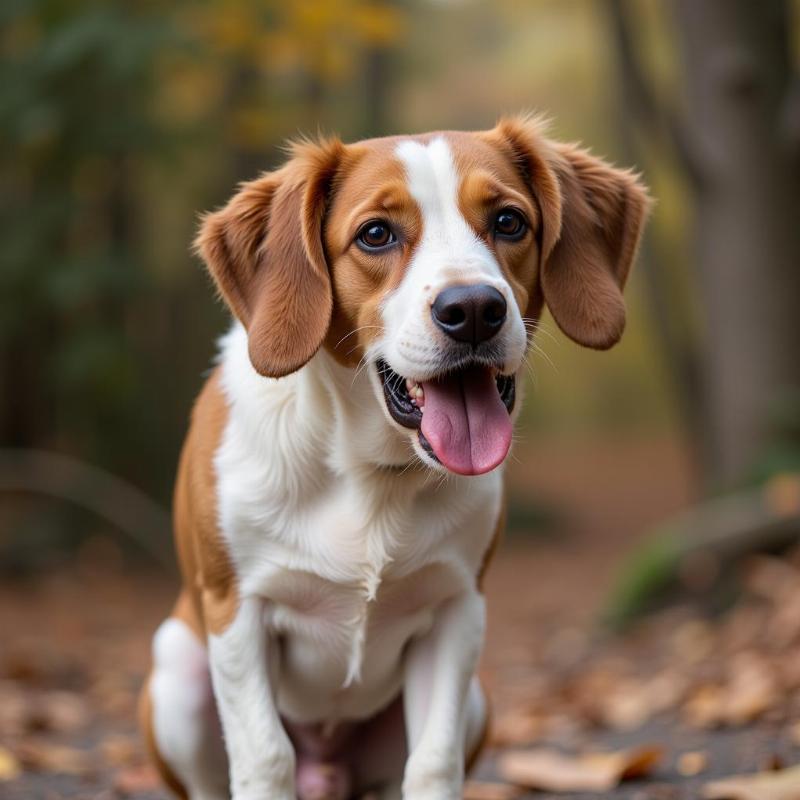Deep breaths in dogs can be completely normal, like after a good run. However, they can also signal underlying health concerns. Understanding the difference between normal panting and concerning deep breathing is crucial for every dog owner in the USA. If your dog is exhibiting unusual breathing patterns, this article will help you navigate the potential causes and guide you on when to seek veterinary attention.
Understanding Normal Dog Breathing
Dogs regulate their body temperature differently than humans. Panting, with rapid, shallow breaths, is their primary way to cool down. This is especially common after exercise, on hot days, or when they’re excited. Observe your dog’s overall demeanor. Is he relaxed and playful? If so, the panting is likely normal. Regular panting stops when the dog is at rest and comfortable.
When Deep Breaths Become a Concern
 Chó thở khó nhọc
Chó thở khó nhọc
While some panting is expected, deep, labored breathing, especially when accompanied by other symptoms, warrants further investigation. This type of breathing might involve exaggerated chest and abdominal movements. The dog might also make wheezing or gurgling sounds. If your dog is taking deep breaths while lying down, resting, or sleeping, and it’s not usual for them, this could be a red flag. Other signs to watch out for include coughing, bluish gums, weakness, and changes in appetite or behavior.
Respiratory Issues
Conditions like pneumonia, bronchitis, kennel cough, and even heartworm can cause labored breathing in dogs. These conditions require veterinary diagnosis and treatment, which can include antibiotics, cough suppressants, or other medications. Regular vaccinations and preventative care, as recommended by the American Kennel Club and your veterinarian, are key to minimizing the risk of these illnesses.
Cardiovascular Problems
Heart disease, a common issue in older dogs, can also lead to difficulty breathing. As the heart struggles to pump efficiently, fluid can build up in the lungs, resulting in labored breathing, coughing, and exercise intolerance. Treatment will vary depending on the specific heart condition.
Pain and Anxiety
Just like humans, dogs can breathe heavily when experiencing pain or anxiety. If your dog has recently undergone surgery, sustained an injury, or is displaying signs of fear or stress, deep breaths could be a response to discomfort. Identifying and addressing the source of the pain or anxiety is crucial to resolving the breathing issue. Consider consulting a veterinarian or a certified dog trainer for guidance on managing anxiety. how to stop a charging dog
What to Do If Your Dog Is Taking Deep Breaths
If you’re concerned about your dog’s breathing, don’t hesitate to contact your veterinarian. Early diagnosis and treatment can significantly improve outcomes. Be prepared to describe your dog’s symptoms in detail, including when they started, how frequently they occur, and any other accompanying signs. Your veterinarian will likely perform a physical exam and may recommend further diagnostic tests like blood work, X-rays, or an electrocardiogram (ECG). how common is dry drowning in dogs
Conclusion
Deep breaths in dogs can range from normal panting to a sign of a serious medical condition. Paying close attention to your dog’s breathing patterns and overall behavior is crucial. If you notice any unusual or labored breathing, consult your veterinarian immediately. Early intervention and proper veterinary care are key to ensuring your furry friend’s health and well-being. Remember, being proactive is always better than waiting for a problem to escalate.
FAQ
- What is the difference between panting and labored breathing? Panting involves rapid, shallow breaths with the mouth open, primarily for cooling down. Labored breathing is deep, often involving exaggerated chest and abdominal movements, and may indicate a health issue.
- When should I be concerned about my dog’s deep breaths? If the deep breaths are persistent, occur at rest, are accompanied by other symptoms (coughing, blue gums, weakness), or are unusual for your dog, seek veterinary attention.
- What are the common causes of labored breathing in dogs? Respiratory infections, cardiovascular problems, pain, anxiety, and heatstroke are some common causes.
- What should I do if my dog is breathing heavily? Contact your veterinarian immediately. Describe your dog’s symptoms in detail and follow their recommendations for diagnosis and treatment.
- How can I prevent respiratory problems in my dog? Regular vaccinations, parasite prevention, maintaining a healthy weight, and avoiding exposure to sick animals can help reduce the risk of respiratory issues.
- Can anxiety cause heavy breathing in dogs? Yes, stress and anxiety can lead to rapid, shallow breathing or panting. Identifying and addressing the source of anxiety is important.
- Is it normal for a dog to breathe heavily after exercise? Yes, panting is normal after exercise as dogs regulate their body temperature. However, if the heavy breathing persists for an extended period or is accompanied by other symptoms, consult a veterinarian.
Beautdogs.us: Your Trusted Partner in Dog Care
Beautdogs.us is your premier online resource for comprehensive and engaging information on all aspects of dog care in the USA. We offer expert advice on dog breeds, health, nutrition, and training, empowering both new and experienced dog owners to provide the best possible care for their canine companions. From understanding breed-specific needs to navigating common health concerns, Beautdogs.us is your one-stop shop for all things dog-related. Contact us today for personalized support: Email: [email protected], Phone: +1 501-555-7529.